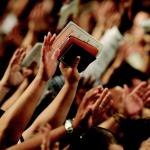Mystery & Wonder | Spirit Filled Community, pt. 9.a

There are many indescribable moments in Acts 1-5.
And all the people saw him walking and praising God:
And they knew that it was he which sat for alms at the Beautiful gate of the temple: and they were filled with wonder and amazement at that which had happened unto him.
Acts 3.9-10
A couple of terms have been generally used to describe moments like this: mystery and wonder. A leading theologian, Kallistos Ware, has studied this thoroughly so we’ll use his definitions:
Mystery
“A mystery, theologically understood, is not just an unsolved problem, a baffling conundrum. A mystery is something that is revealed to our understanding, but it’s never exhaustively revealed because it reaches out into the infinity of God . . . How can God be simultaneously both one and three? How can Christ be fully and completely God, fully and completely man? In the end, we cannot explain . . . Our theological statements set a fence around the mystery, but they don’t exhaustively describe it.”[1]
A mystery is a way we try to describe the indescribable glory of God or God’s activities. Here are some mysterious moves of God:
- Acts 1-5: 2.19: wonders in heaven above
- 2.22: miracles and wonders and signs
- 2.43: wonders and signs
- 4.30: wonders
- 5.12: signs and wonders
Wonder
“To a lot of theology we could apply the criticism, ‘Your God is too small.’ Without a sense of amazement, a willingness to be surprised, without astonishment, there can’t be real teaching or study of theology . . . We need to have in our study of theology some sense of beauty and mystery . . . So there can be no authentic theology, no authentic personhood without a sense of wonder.”[2]
Wonder then is typically used to describe the reaction within us to the mystery of God. Here are some reactions of wonder:
- Acts 1-5: 2.6: confounded
- 2.7: amazed and marveled
- 2.12: amazed
- 3.10: filled with wonder and amazement
- 3.11: greatly wondering
- 3.12: marvel
- 4.13 marvelled
- 5.5, 11: great fear
Mystery and wonder flows in Acts 1-5 because the Church is being created out of nothing. There are 3 stories I want to focus on (in this 2 part article) with all the elements of mystery and wonder. These stories of mystery and wonder produce spontaneous worship of God.
The Early Church (E.C.) is marked by mystery and wonder. The Church often responds to mystery and wonder with spontaneous worship. In these stories, look for mystery, wonder, and worship.
I. THE LAME MAN WALKS
In Acts 3, Peter and John go to the Temple to pray as is their daily habit (verses 1-3). A man who was lame from birth is brought to the gate so he can beg every day. Today, he catches the attention of Peter and John and asks for money.
And Peter, fastening his eyes upon him with John, said, Look on us. Acts 3.4
Now really, if we’re buying into this idea of mystery, then…
the mystery starts here
Peter knows something is going to happen.
And he gave heed unto them, expecting to receive something of them. Acts 3.5
The lame man is hoping for the same old response, a little money. However, Peter already knows the mystery of healing is getting ready to flow.
How often does God sneak into our world in a way that seems ordinary, before He reveals the extraordinary?
Then Peter said, Silver and gold have I none; but such as I have give I thee: In the name of Jesus Christ of Nazareth rise up and walk.
And he took him by the right hand, and lifted him up: and immediately his feet and ankle bones received strength.
Acts 3.6-7
the mystery of healing breaks in
In the middle of the lame beggar’s daily grind, God just shows up. There is no indication that the beggar had enough faith for the miracle. He was expecting something else, a little change. However, all of a sudden, he’s on his feet. The lame man walks.
Has anyone been surprised by a mysterious move of God when you least expect it?
And he leaping up stood, and walked, and entered with them into the temple, walking, and leaping, and praising God. Acts 3.8
a sense of wonder overtakes him as he stands to his feet
His praise isn’t just verbal praise, but his body language is telling us something. He’s all over the place, “walking and leaping, and praising God.”
He’s overcome with ecstatic wonder at this gift of healing. He begins to spontaneously worship God. He draws a crowd because everyone knows he’s the lame beggar (verse 9).
And they knew that it was he which sat for alms at the Beautiful gate of the temple: and they were filled with wonder and amazement at that which had happened unto him. Acts 3.10
what were they filled with? “wonder and amazement”
Wonder literally means dumbfounded, not knowing what to say or do, immovable.
Amazement means wonder or fear that blows your mind, like ecstasy or a trance.
These people see the lame man jumping around praising God, and they have no idea what to do.
And as the lame man which was healed held Peter and John, all the people ran together unto them in the porch that is called Solomon’s, greatly wondering. Acts 3.11
they were “greatly wondering”
It’s the same word as “wonder” . . . only more. Their reaction of wonder grew the more they realized what was happening.
When was the last time God blew your mind in worship?
“Pentecostal worship means more than reveling in the joyful experience of God’s power. It is full of awe and wonder as it contemplates the majesty of God.”[3]
Peter sees the crowd and seizes the opportunity to preach a great salvation message (Acts 3.12-26).
The religious leaders, jealous because of the multitudes, arrest Peter and John (Acts 4.1-3).
5,000 people, still in wonder from the miracle, listen to the sermon, and get saved (Acts 4.4).
everyone reacts, one way or another, to the mystery of God
We see mystery, wonder, and worship intertwined throughout the story as THE LAME MAN WALKS.
pic credit: jaefrench | 01.03.17 | pixabay
For more writings on the Kingdom of God CLICK
notes:
- Kallistos Ware, “How Should We Study Theology,” Seattle Pacific University Palmer Lectures in Theology, iTunes/iTunesU, March 17, 2008.
- Ibid.
- Byron D. Klaus, “The Mission of the Church,” in Systematic Theology, ed. Stanley M. Horton (Springfield, MO: Logion Press, 2002), 586.












